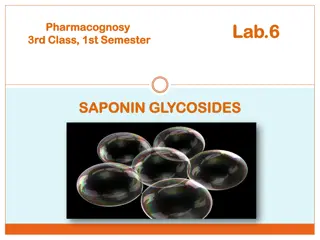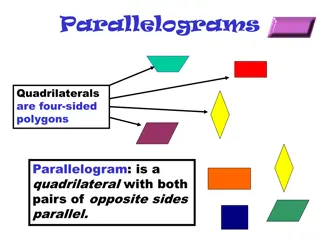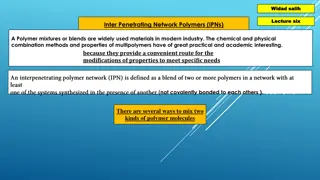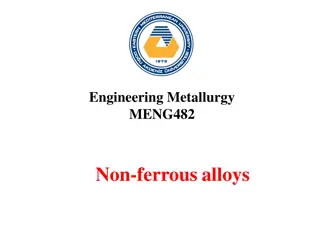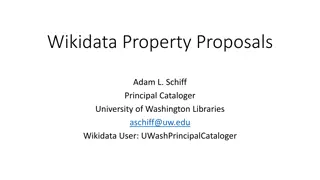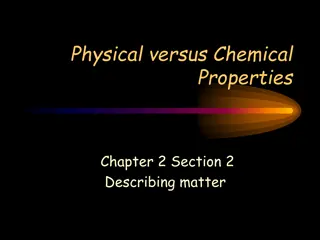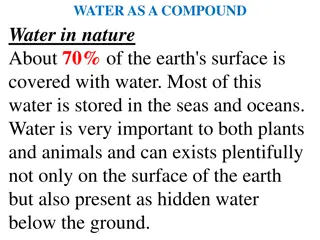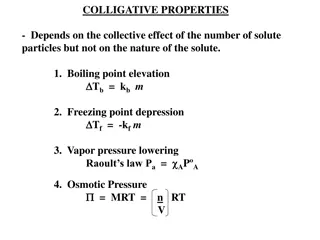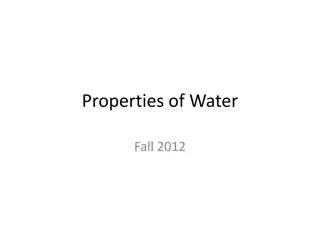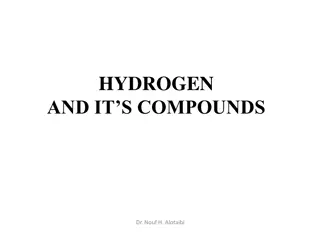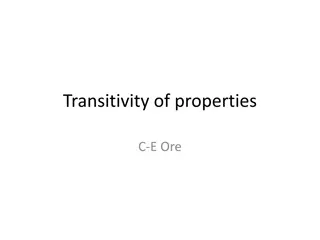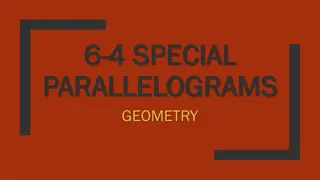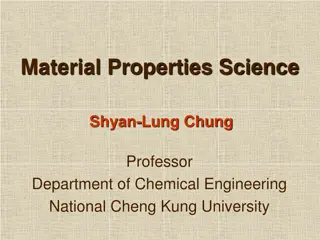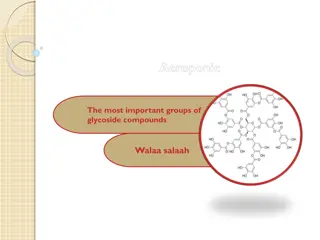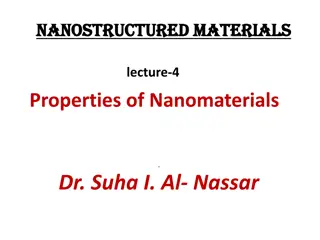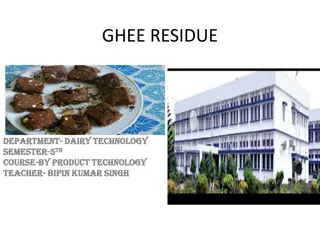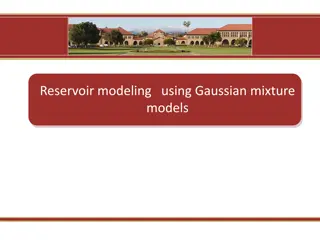Understanding the Rule of Mixtures in Composite Materials
The Rule of Mixtures (ROM) is a weighted method for predicting the properties of composite materials, such as fiber-reinforced polymers (FRP). This method relies on assumptions regarding the homogeneity and properties of fibers and matrices. By combining volume fraction and properties linearly, the
5 views • 23 slides
Understanding Saponin Glycosides in Pharmacognosy: Properties and Applications
Saponin glycosides, found in various plants, are compounds with diverse benefits ranging from cholesterol regulation to potential anticancer properties. They form colloidal solutions in water and are used in soap manufacturing due to their unique properties. Additionally, saponins have bitter taste,
7 views • 18 slides
Understanding Properties and States of Matter in Physical Science
Matter is made up of elements that cannot be broken down further. Different mixtures have distinct properties, such as solutions, colloids, and suspensions. Physical properties like viscosity and density can be observed without changing the material's composition. Chemical properties, like flammabil
2 views • 15 slides
South East Asia Collagen
Collagen, with its unique properties, has been extensively used in food processing industries. These properties are usually categorized into two groups. First, the properties associated with its gelling behavior, such as texturizing, thickening, gel formation, and water binding capacity, and second,
0 views • 2 slides
Guidelines for Handling Case Properties and Seized Assets in Legal Proceedings
This informative content discusses the handling of case properties involved in offenses, including seizure, custody, disposal, and coordination among government departments. It covers various aspects such as the types of case properties, custody procedures, provisions under Section 516-A Cr.PC, and
0 views • 8 slides
Understanding Metals: Properties, Reactions, and Applications
Metals exhibit unique properties such as conductivity, metallic bonding, and reactivity with acids. They can be combined to form alloys with enhanced characteristics. This overview covers the properties, reactions, and utility of metals in various applications, providing insights into their behavior
2 views • 50 slides
Understanding Furan and Thiophene: Structures, Properties, and Uses
Furan and Thiophene are important heterocyclic organic compounds with distinct structures and properties. Furan, a five-membered aromatic ring, is used in specialty chemical production and has unique physical properties. Thiophene, a sulfur-containing compound, finds applications in agrochemicals an
2 views • 8 slides
Classification of Elements and Periodicity in Properties: Overview and Evolution
The journey of understanding the classification of elements and periodicity in properties begins with early laws like the Law of Triads and Newland's Law of Octaves. Mendeleev's Periodic Law revolutionized the organization of elements, leading to the modern periodic table. Discoveries of eka-alumini
3 views • 32 slides
Understanding Parallelograms: Properties, Theorems, and Tests
Parallelograms are four-sided polygons with unique properties that include having both pairs of opposite sides parallel. Explore key theorems, tests, and properties of parallelograms such as opposite side and angle congruency, diagonal bisecting, and conditions for identifying a quadrilateral as a p
1 views • 19 slides
Interpenetrating Network Polymers and Composite Materials in Modern Industry
Polymer mixtures or blends, known as Interpenetrating Network Polymers (IPNs), offer convenient routes for modifying properties to meet specific needs in modern industry. IPNs involve not covalently bonded polymers that can be mixed in various ways to create unique material properties. Additionally,
2 views • 13 slides
Understanding Physicochemical Properties of Drugs
The physicochemical properties of drugs play a crucial role in their pharmacological effects. These properties include physical and chemical characteristics that influence interactions with biomolecules. Solubility, partition coefficient, and dissociation constant are key factors affecting drug beha
1 views • 46 slides
Algebra Rules and Properties
Explore the fundamental rules and properties of algebra and indices, including commutative, associative, and distributive properties. Learn about negation, zero properties, and the zero factor property, illustrated with examples and common errors. Engage in activities to apply and test your understa
1 views • 21 slides
Overview of Non-Ferrous Alloys in Engineering Metallurgy
Non-ferrous alloys play a crucial role in engineering metallurgy due to their unique properties and advantages over ferrous alloys. This article explores the classification of materials, the limitations of ferrous alloys, and the properties and applications of non-ferrous metals like copper. Copper,
0 views • 25 slides
Understanding Wikidata Properties and Data Types
Learn about Wikidata properties and data types, their importance in structuring data, and how they are used to create statements and qualifiers in Wikidata. Explore the purpose of properties, their labels, descriptions, aliases, and data types such as items, strings, monolingual text, external ident
0 views • 26 slides
Understanding Amino Acids: Qualitative Tests and Properties
Amino acids play a crucial role as building blocks of proteins and can be converted into specialized products. There are 20 common L-α-amino acids found in mammalian proteins, each with a unique structure and classification based on their side chain properties. Amino acids exhibit optical activity,
1 views • 34 slides
Understanding Physical and Chemical Properties of Matter
Explore the distinction between physical and chemical properties of matter in Chapter 2, Section 2. Physical properties can be observed without changing the substance's identity, such as color and density, while chemical properties require altering the substance to observe characteristics like react
5 views • 20 slides
Understanding Quantum Wires and Nanowires: Properties and Applications
Quantum wires, quantum dots, and nanowires are essential components in nanotechnology due to their unique properties and applications. Quantum wires are one-dimensional systems with restricted electron movement, while quantum dots are zero-dimensional, limiting electron movement in all dimensions. N
3 views • 12 slides
Understanding Nonelectrolytes in Solutions
Physical properties of substances are classified into colligative, additive, and constitutive properties. Colligative properties depend on the number of particles in a solution and are similar for different nonelectrolytes. Additive properties are based on the total contribution of atoms, while cons
1 views • 14 slides
Water as a Compound: Essential Properties and Properties
Water, a vital element covering 70% of the Earth, is composed of hydrogen and oxygen. It has various physical and chemical properties, acts as a universal solvent, and plays crucial roles in nature. From boiling and freezing points to chemical reactions, water's significance is undeniable. Its sourc
0 views • 63 slides
D-Block Elements: Properties and Classification in Chemistry
Welcome to the Department of Chemistry at Kisan Veer Mahavidyalaya, Wai. Explore the Chemistry of Elements of the 3d series, focusing on d-Block Elements and Transition Elements. Learn about their electronic structure, colored ions, magnetic properties, oxidation states, and complex formation. Under
0 views • 34 slides
2020 Company Confidential - Add-Ons and Variable Properties Guidelines
This document provides guidelines for add-ons and variable properties within the context of the 2020 Company Confidential data. It covers various aspects such as variable validations, logic return types, export/import considerations, and the handling of accessory items. The content emphasizes the pr
0 views • 39 slides
Understanding Colligative Properties in Solutions
Colligative properties in solutions depend on the total concentration of solute particles present, impacting properties such as boiling point elevation, freezing point depression, vapor pressure lowering, and osmotic pressure. Boiling point elevation is directly proportional to the number of solute
1 views • 19 slides
Understanding Priority Queues and Heaps in CSE 373 Lecture
Today's lecture in CSE 373 covers the Priority Queue Abstract Data Type (ADT), the properties of heaps, and their implementations. Key topics include the completeness property of heaps, different priority queue implementations such as the binary search tree for faster insert and find operations, and
0 views • 21 slides
Understanding Physical and Chemical Properties of Matter
Explore the distinction between physical and chemical properties of matter in Chapter 15, Section 2. Learn to classify properties such as color, flammability, odor, shape, taste, density, and more. Understand how physical properties can be observed without altering the substance's identity, while ch
0 views • 17 slides
Understanding the Unique Properties of Water: Adhesion, Cohesion, and Hydrogen Bonds
Explore the fascinating properties of water molecules, including adhesion, cohesion, and hydrogen bonding, and their significance in nature and life on Earth. Learn how these properties contribute to various phenomena and understand the formation of hydrogen bonds in water molecules.
0 views • 27 slides
Exploring Hydrogen and Its Compounds: Properties and Isotopes
Hydrogen, the most abundant element in the universe, has unique properties that make it resemble both alkali metals and halogens. It exists mainly in combined states, except in volcanic gases, and its isotopes exhibit distinct chemical and physical characteristics. The ionization energy of the H-H b
0 views • 37 slides
Exploring Silly Putty: Borax Concentrations and Material Properties
Created by mixing borax with glue, silly putty is a fascinating material with varying properties based on borax concentrations. Through a hands-on experiment, participants make different batches of silly putty to observe how high, medium, and low borax concentrations affect its texture and behavior.
0 views • 4 slides
Understanding Transitivity of Properties in Typed Systems
Exploring the concept of transitivity in properties within a typed system, this content delves into explicit and possibly transitive properties, showcasing how properties relate to each other and how they can be implicitly or explicitly defined. Through examples and explanations, the content provide
0 views • 18 slides
Exploring Properties of Parallelograms, Rhombuses, and Rectangles
Delve into the theorems and examples related to the properties of parallelograms, rhombuses, and rectangles. Understand concepts such as diagonals in rhombuses, perpendicular diagonals in parallelograms, and congruent diagonals in rectangles. Learn to identify these shapes based on specific criteria
0 views • 11 slides
Comprehensive Course on Material Properties and Science
Delve into the world of material properties and science with a course led by Professor Shyan-Lung Chung from the Department of Chemical Engineering at National Cheng Kung University. Explore topics ranging from atomic scale structures to mechanical properties and their applications, supported by opt
0 views • 10 slides
Exploring the Metaphysics of Mind: Substance, Properties, and Views
Delve into the realm of metaphysics as it pertains to the nature of reality, with a focus on substance and properties. Explore the concepts of substance dualism, monisms like idealism and materialism, and the debate around mental properties and their relation to physical properties. Consider various
0 views • 8 slides
Exploring Nanoscience and Nanotechnology with Dr. Abeer Alshammari
Delve into the fascinating world of nanoscience and nanotechnology through the elective course PHYS 476 with Dr. Abeer Alshammari. Learn about the unique properties of nanomaterials, including microstructure, defects, dislocations, twins, stacking faults, and more. Discover how nano-dimensions impac
0 views • 10 slides
Overview of Important Glycoside Compounds and Their Properties
Glycoside compounds play a significant role in various biological processes, with groups like steroids and cardenolides showcasing notable medicinal effects. Steroids are crystalline substances with specific solubility characteristics, while cardenolide glycosides are known for their toxic effects o
0 views • 13 slides
Understanding Mechanical Properties of Nanostructured Materials
Nanostructured materials exhibit unique mechanical properties due to factors like grain boundary structure and dislocation movement. Reduction in grain size can enhance strength and hardness while reducing ductility. Nanomaterials may reach theoretical strength levels, significantly higher than sing
0 views • 23 slides
Understanding Heat Treatment in Steel Alloys
Heat treatment is a crucial method to modify the physical and chemical properties of materials like steel. The amount of carbon in plain carbon steel determines the heat treatment required, influencing properties like hardness and machinability. Different types of heat treatment include annealing, n
0 views • 21 slides
Understanding Ghee Residue: Properties, Yield, and Applications
Titled "Understanding Ghee Residue: Properties, Yield, and Applications", the content delves into the by-product of ghee manufacturing known as ghee residue. Highlighting its physico-chemical and functional properties, lipid content, milk sugars, flavoring profiles, antioxidant properties, and fat r
0 views • 12 slides
Entity-specific Rankings of Knowledge Base Properties
Towards entity-specific rankings of knowledge base properties, this research explores the problem of property ranking for entities based on their attributes and properties. Various applications in knowledge base curation and natural language generation are discussed, along with related work in entit
0 views • 26 slides
Near-UV Satellite Observations for Retrieving Aerosol Properties
Near-UV satellite observations offer a valuable method for retrieving aerosol properties, including aerosol optical depth, absorption, layer height, and surface albedo. These observations provide advantages like sensitivity to aerosol properties and negligible gas absorption interference. However, c
0 views • 16 slides
Understanding Matter: Properties, Changes, and Classification
Explore the classification of properties and changes in matter, including physical and chemical properties, extensive and intensive properties, pure substances versus mixtures, and homogeneous versus heterogeneous mixtures. Learn about pollution-producing processes involving physical changes and the
0 views • 7 slides
Reservoir Modeling Using Gaussian Mixture Models
In the field of reservoir modeling, Gaussian mixture models offer a powerful approach to estimating rock properties such as porosity, sand/clay content, and saturations using seismic data. This analytical solution of the Bayesian linear inverse problem provides insights into modeling reservoir prope
0 views • 10 slides

